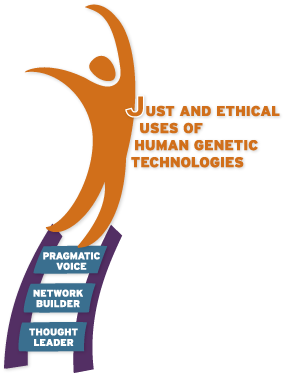Mission & Strategies
How we worked
Generations Ahead was the only organization in the United States that worked with a diverse spectrum of social justice stakeholders—including reproductive health, rights and justice, racial justice, LGBTQ, and disability and human rights organizations—on the social and ethical implications of genetic technologies.
We expanded the public debate and promoted policies on genetic technologies that protect human rights and affirm our shared humanity. We sought to ensure inclusion, fairness and equality for all people in the use of genetic technologies now, and for generations ahead.
Originally founded in 2004 as the Gender, Justice and Human Genetics Program of the Center for Genetics and Society, we evolved into a separate organization in 2008. Generations Ahead quickly established itself as a thought leader and trusted resource for social justice advocates on the issue of human genetic technologies.
Our Mission
Generations Ahead’s mission was to bring diverse communities together to expand the public debate and promote policies on genetic technologies that protect human rights and affirm our shared humanity.
Moving On
As of January 31, 2012, Generations Ahead is closed as an organization. We’ve documented our story and the difficult decision to close in our final report, Releasing Seeds to the Wind: The Story of Generations Ahead (PDF).
Executive Director Sujatha Jesudason has moved on to start a “think and do tank” at the University of California, San Francisco. This new project, the CoreAlign Initiative, will work to invigorate the U.S. movement for reproductive health, rights and justice by developing a pipeline of strong leaders, innovative ideas and new voices. The CoreAlign Initiative will incubate a network to develop and implement a 30-year vision and plan for transforming public discourses and policies. The ultimate goal is a future where every woman will have the resources, rights and respect to make reproductive decisions for herself and her family.
This Initiative also presents a ripe opportunity to build on Generation Ahead’s model of organizing and cross-movement work, yet it won’t likely pick up specific campaigns about reproductive and genetic technologies. And while the CoreAlign Initiative will focus on cross-movement alignment, learning from other social justice movements, it may not extend beyond the reproductive health, rights and justice sectors for several years.
The Work of Generations Ahead
Issues involving human genetic technologies have powerful and intimate implications for family formation, community life, health care, economic development, and scientific innovation. We brought advocates together to organize and fight for policies that lead to more just and ethical uses of human genetic technologies.
In debates about human genetics, we paved the way to ethical uses of these technologies by being a:
PRAGMATIC VOICE, articulating the values and concerns of historically excluded communities (women, communities of color, LGBTQ and people with disabilities).
NETWORK BUILDER, mobilizing and linking social justice advocates into a growing and responsive network of allies active on these issues, and
THOUGHT LEADER and DRIVER of game-changing strategies in advocacy, organizing and communications to ensure that public policy on genetic technologies is shaped at the intersection of gender, race, age, sexuality and ability.
To learn more about the change and impact Generations Ahead has made on behalf of our communities and movements, and about the lessons and wisdom gained from our experiences, please read our final report, Releasing Seeds to the Wind: The Story of Generations Ahead (PDF). We share our story with the hopes that it will benefit leaders, organizations and advocacy efforts moving forward.

